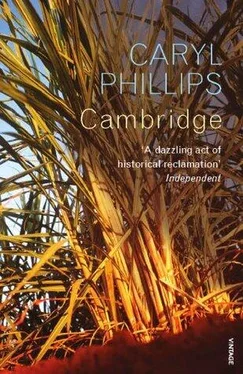Caryl Phillips - Cambridge
Здесь есть возможность читать онлайн «Caryl Phillips - Cambridge» весь текст электронной книги совершенно бесплатно (целиком полную версию без сокращений). В некоторых случаях можно слушать аудио, скачать через торрент в формате fb2 и присутствует краткое содержание. Год выпуска: 2009, Издательство: Vintage Digital, Жанр: Современная проза, на английском языке. Описание произведения, (предисловие) а так же отзывы посетителей доступны на портале библиотеки ЛибКат.
- Название:Cambridge
- Автор:
- Издательство:Vintage Digital
- Жанр:
- Год:2009
- ISBN:нет данных
- Рейтинг книги:5 / 5. Голосов: 1
-
Избранное:Добавить в избранное
- Отзывы:
-
Ваша оценка:
- 100
- 1
- 2
- 3
- 4
- 5
Cambridge: краткое содержание, описание и аннотация
Предлагаем к чтению аннотацию, описание, краткое содержание или предисловие (зависит от того, что написал сам автор книги «Cambridge»). Если вы не нашли необходимую информацию о книге — напишите в комментариях, мы постараемся отыскать её.
Cambridge — читать онлайн бесплатно полную книгу (весь текст) целиком
Ниже представлен текст книги, разбитый по страницам. Система сохранения места последней прочитанной страницы, позволяет с удобством читать онлайн бесплатно книгу «Cambridge», без необходимости каждый раз заново искать на чём Вы остановились. Поставьте закладку, и сможете в любой момент перейти на страницу, на которой закончили чтение.
Интервал:
Закладка:
With regard to the spiritual welfare of the negro, Mr Rogers felt that as a member of the Anglican Church this was not his duty. The Moravians and Methodists seemed to find some purpose to such labour, but Mr Rogers claimed that to pitch a sermon or an interpretation of the Gospel at a level base enough for the negro to understand would require a pastor with a thorough knowledge of negro customs, and modes of speech. Such a mentor would also have to instill in his charges the understanding that the emotions and intellect of the untutored savage are not those of the European, who learns from the Christian message a blessed form of self-control from an early age. A negro will one day shed tears at the plight and sufferings of our sweet saviour, and the very next day plead total ignorance of our redeemer's existence. Were one's aim to be a revolution in the moral conduct of the negro, then Mr Rogers was adamant that the teachings of massa would be of greater benefit than the preachings of any minister.
It was at about this time that we fell into a deep and lengthy silence. I was trying to frame my next assault upon Mr Rogers when I heard a light snore emanate from his person. It seems as though the custom of taking a rest after lunch extends to those who watch over our spiritual and moral welfare. I longed for Mr Rogers to re-awaken so that I might question him of Mr Wilson, and to this end I even toyed with the idea of asking one of the male house negroes to arouse him. However, I finally decided it prudent to let him slumber in the shade of the piazza, for the stiff sea-breeze had died away and a slothful calm prevailed. The extensive view from the piazza features an expanse of harvestable vegetation, but the higher slopes are rich with thick dark forest, parts of which I imagine could never have been trodden by the feet of man. The arrangement of the majestic trees, some solitary, others elegantly grouped, presents a picturesque scene. These trees of noble growth cover all the banks and ridges, while the master-tree, the tall coconut, moves her fronds in stately regal fashion. These giant ostrich-feather branches hung almost motionless in what little breeze remained. Down towards the coast, which from the height of the Great House appears rough and barren, are clustered numerous fruit trees upon whom I am learning to bestow a name; the sea-side Grape, sugar-apple, breadfruit, soursop, pawpaw, custard apple, mango, lime, acacia, orange, guava, etc. Examples of all these trees are to be found, although I cannot as yet claim the expertise of a trained eye.
Presently the carriage could be seen returning up the steep ascent of the hill. As though aware of my intentions all along, the frail Mr Rogers only now managed to stir himself from sleep. He shook slightly, as a puppy might, and then coughed heavily so that his body trembled like a leaf. He rose sheepishly, but stood formally to attention, embarrassed it seemed at having ascended into the higher world and left me unattended in this. Furthermore, he seemed distressed that he should have re-entered this world in such an ill-organized fashion. Our contrite churchman stuttered a few words of apology, then quickly gathered his walking cane and bade me a hearty and warm, if somewhat hurried, farewell. As I watched him climb aboard his carriage I found it difficult to arrest the laughter welling up inside me. Poor Mr Rogers. After enduring the predicament of trying to contain the excesses of his friend's well-lubricated tongue, he then fails wholly to engage with his host and imposes upon her an hour or so of his slumbering silence. I wondered if I would ever again set eyes upon this man's timid face. Goodbye, Mr Rogers!
Feeling near-drained by what had already proved an exhausting and eventful day, I retired to my room to rest and prepare for my customary solitary dinner. Mr Brown had taken to dining alone, either after I had concluded my repast, or before I had begun it, according to his whim. However, I was delivered from a light siesta by a knock upon the door, which then opened. Before me stood Mr Brown, bold and unapologetic in his manner, asking if I might wish to dine with him this evening. I do not know if it was curiosity, or simply surprise that stirred me to agree, whereupon he nodded briskly and withdrew as quickly as he had appeared. The next on the scene was a joyful Stella, who bustled about as though I had in some way achieved a minor success. I resented greatly Stella's gay disposition and now solemnly wished that I had found some way to refuse Mr Brown's crudely presented offer of his company, but clearly it was too late.
And so once again I found myself at my father's table in the company of the enigmatic Mr Brown. However, I was unable to credit my senses when we were at once joined by the same insolent negro woman who, as I had already noted, seemed to exercise some authority in the house beyond that of Stella. I asked Mr Brown outright who was this woman, and had she a position which entitled her to sit with us at table. He gave no more answer than a dismissal of the intrusive black wench with a wave of his hand, as though she were some trifle. She slid out noiselessly, but not before rewarding me with a spontaneous glimpse of her white grinders. Again I demanded some explanation of this slattern's presence, but Mr Brown sighed and answered that she was no more to him than Stella was to me. I thrust iron into my voice and declared that I would never enjoin Stella to sit with me at my dining table. Mr Brown appeared unconcerned, and remarked that when I had spent more time among them I might come to understand that everything is not as in England. This dismissive response made my blood boil, though I soon recaptured my equilibrium. Having achieved this little momentum I pressed on and asked after the nature of the earlier dispute witnessed between himself and the impressive black Hercules. Mr Brown's features assumed a most weary aspect, and he set down his implements as though preparing himself for some lengthy courses of action. Either he would explode in fury, or he would patiently explain to me what I sought to know. I held my breath, for I confess I was a little nervous, unsure as I was which way he might spring, for my understanding of this man was slight. As it happened, I was to be rewarded with an explanation.
He began with a short summary of the deficiency laws, which were introduced with the intention of increasing the white element in these islands. Thus an estate could be fined for having less than one white person to every thirty-five negroes. The fear was of insurrection, and discipline became the chief and governing principle on every estate. Unfortunately, these deficiency laws proved difficult to regulate, for Caribbean emigration was equally difficult to promote. Those who came were usually the poorest sort of tradesmen and clerks, unqualified in any type of plantation work. Carpenters who knew not a saw from a chisel, bricklayers who knew not wood from stone, book-keepers who were illiterate and innumerate, so that the numbers of negroes in proportion to whites was not only growing, but the quality of the whites was rapidly falling. Mr Brown continued at his unhurried pace. 'The old fool you call Hercules is the chief trouble-maker of the estate. He steals, lies and provokes the others to acts of minor rebellion which must be quashed at once.' Mr Brown apologized, yes, he apologized, for any discomfort caused by my witnessing of his behaviour, but he insisted that punishment, varying in severity according to the master's disposition, often called for the use of the whip. With this he rose from the table, bowed and left me to complete my dinner alone.
I must conclude my summary of this remarkable day by acknowledging that I am learning a little about the passions of the white society in these parts. I will now write to Father and tell him of my adventure. I will also relate to him the little I know of his manager Mr Wilson (and his subsequent flight to a neighbouring island), and inform him of the strange presence of this Mr Brown at the helm of his estate. (Good manners will prevent my mentioning, at this time, Mr Brown's friendship with the negro woman.) I also feel compelled, having listened to the words of Mr McDonald with some interest, to recommend that Father either take a more active interest in his estate, which would involve nothing less than a protracted visit, or find some way of relinquishing control, for surely this system of long-distance ownership is contributing to social anarchy in these parts.
Читать дальшеИнтервал:
Закладка:
Похожие книги на «Cambridge»
Представляем Вашему вниманию похожие книги на «Cambridge» списком для выбора. Мы отобрали схожую по названию и смыслу литературу в надежде предоставить читателям больше вариантов отыскать новые, интересные, ещё непрочитанные произведения.
Обсуждение, отзывы о книге «Cambridge» и просто собственные мнения читателей. Оставьте ваши комментарии, напишите, что Вы думаете о произведении, его смысле или главных героях. Укажите что конкретно понравилось, а что нет, и почему Вы так считаете.












